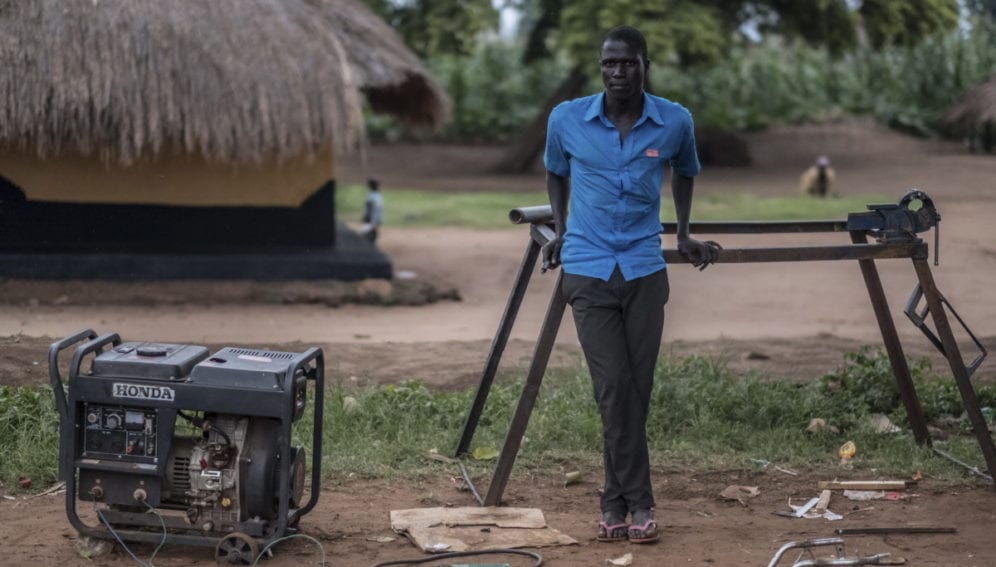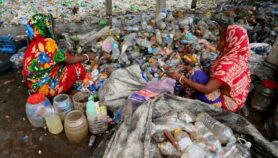By: Gilbert Nakweya
Send to a friend
The details you provide on this page will not be used to send unsolicited email, and will not be sold to a 3rd party. See privacy policy.
[NAIROBI] Rufus Munyu, a commercial welder in Kenya’s Kisumu County, relies on electricity to have a successful day at work. The 30-year old Munyu says that power outage is a common phenomenon, especially when it rains.
“This area receives rainfall regularly and that has led to frequent outages here,” says Munyu, adding that he had to buy a diesel generator as a backup electricity.
Munyu keeps the generator outside his business but he is forced to take it in when it is raining. “The generator’s fumes get messy and stuffy here when we have to deliver to our clients’ needs and it’s raining outside,” he says but adds that he is unaware of the negative health impacts of diesel generators.
“The more outages each country experiences, the more diesel generators are likely to be used”
DeVynne Farquharson, Carnegie Mellon University
In most health centres, schools and businesses located in Sub-Saharan Africa, diesel generators are on standby, just in case of a power blackout, a common phenomenon in the region. But more than helping provide reliable electricity, diesel generators contribute to greenhouse gas emissions and negatively impact health, experts say.
Muindi Kanyiva, an epidemiologist and air pollution researcher at the African Population and Health ResearchCenter, Kenya, tells SciDev.Net that chemicals or fine particulate matter in diesel exacerbate symptoms of diseases that affect the lungs, heart and the central nervous system.
"Long-term health effects of diesel particulate matter include cancers, inflammation of blood vessels and ischemic heart disease,"Kanyiva says.
Power outages and backup diesel generators
In a study which was published last year (15 October) in Nature Sustainability, DeVynne Farquharson, the lead author and colleagues at the US-based Carnegie Mellon University, assessed the rates at which different countries experience power outages across Sub-Saharan Africa.
The study estimates that in a typical month in 2014, the number of electricity outages among the 15 African countries analysed ranged from nearly one in South Africa to about 33 in Nigeria.
“The more outages each country experiences, the more diesel generators are likely to be used,” explains Farquhason, adding that countries that enjoy relatively low levels of fossil-fuel electricity generation from the central grid face drastic changes in emissions rates when power outages force backup generators to be used.
Negative health outcomes
According to a commentarypublished in the American Journal of Respiratory and Critical Care Medicine in 2011, more than 90 per cent of businesses and 30 per cent of Nigerian homes have diesel generators.
“In Nigeria, indirect evidence of the impact of diesel exhaust on lung cancer is indicated by its rising incidence among urban-based nonsmokers less than 60 years old, most of whom use diesel generators on a daily basis,” says the commentary.
Diesel exhaust has about 40 toxic air contaminants, it adds.
Farquhason says that the negative health impacts of diesel generators could be greater than that of centralised power plants. He explains that diesel generators are generally located at the premises of homes and businessesunlike centralised power plants that tend to be located far from population centres.
Alternatives to backup generators needed
Sub-Saharan Africa needs alternatives to backup generators to enhance sustainability and realisation of UN Agenda 2030’s goal number seven that calls for universal access to affordable, reliable, sustainable and modern energy for all.
“Governments need to move in the direction of clean fuels for vehicles and power generation.”
MuindiKanyiva, African Population and Health ResearchCenter
David Njugi, energy services engineer at the Kenya Association of Manufacturers, tells SciDev.Net that backup diesel generators should not be seen as the only solution to power outages in Sub-Saharan Africa.
Companies are now exploring and focusing on adopting renewable energy such as solar and biogas to secure their power supply, Njugi says.
According to Njugi, renewable projects such as rooftop solar plants installed to be used by a company or in a commercial residence tend to be expensive. For example, the unit cost of lead-acid batteries is US$250 per kilowatts-hour while that of lithium-ion batteries is US$ 450-500 per kilowatts-hour.
Environmental conservation or saving lives?
Anne Omambia, climate change officer at the Kenya’s National Environment Management Authority, says that the approach towards clean energy should be centred on the greater good for the people.
“Even as we seek environmental conservation, we need to look at the balance between many things such the health of the people,” explains Omambia, “It would be important to have a diesel backup generator to save the life of a patient in a hospital than lose such a life.”
Omambia’s concerns appear to be supported by a study in Ghana which shows that the risk of death in healthcare facilities “increased by 43 per cent for each day the power was out for over two hours”.
According to Omambia, the technological and costs challenges faced by people in Sub-Saharan Africa are many, especially the main holdups to the adoption of alternative sources of clean energy such as solar.
“I would rather prefer we have homes using diesel generators to have light to those that have kerosene lamps,” she says, adding that kerosene lamps can lead to more indoor pollution unlike diesel generators that are usually placed out of the rooms where people live.Jennifer Burney, an associate professor and an environmental scientist at the US-based University of California San Diego, agrees and adds that the bigger contributors to overall pollution levels in Africa are residential emissions mostly fromcookstoves, kerosene and, increasingly transportation emissions from older motor vehicles.
But Burney says that emissions inventories for the continent or individual African countries are lacking, thus making it difficult to get a clear picture of the contributions of diesel to overall pollution levels.
Kanyiva calls on African governmentsto start phasing out diesel from the markets in the long-term. "The cost on the health of citizens is too high and governments need to move in the direction of clean fuels for vehicles and power generation," Kanyiva says.
This piece was produced by SciDev.Net’s Sub-Saharan Africa English desk.














